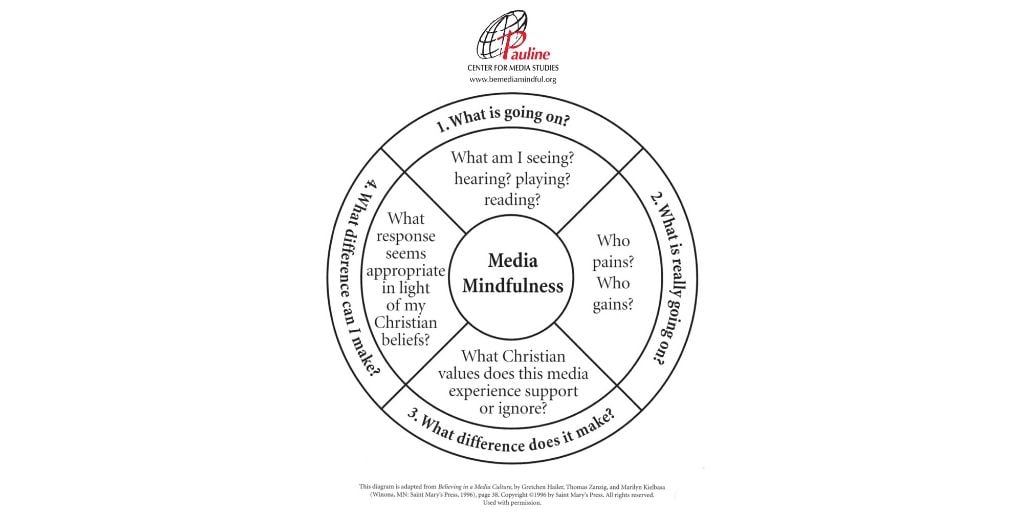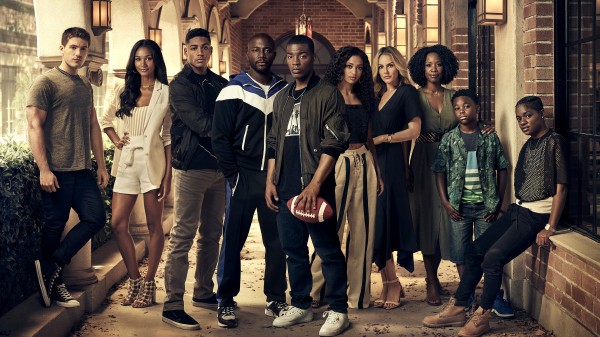The word is slowly emerging from a long stretch of staying at home to slow the spread of the COVID-19 virus, and many of us have been glued to screens for much of that time. We may watch a bit less as we can go out more, but what can we learn about using our screentime wisely?
Our friend Sister Nancy Usselmann, FSP, National Director of the Pauline Center for Media Studies, writes, talks and teaches about what she calls "Media Mindfulness." We asked her to reflect on what that means at this time. Through the prism of The CW drama All American, she does just that. -- Editor
The last few months have been great time to catch up on our favorite shows, but any opportunity to find new media also affords a little time to consider how as Christians we can watch our media reflectively and mindfully, sharing together the content that is aimed to entertain as well as inform.
As a media-literacy educator and reviewer, I watch a lot of movies and streaming shows to be able to reflect on theology and the popular culture. So I always question how we can integrate a reflective, spiritual life with all the media we consume and create. It requires us to be critical engagers of the culture and not just passive consumers of all the messages it communicates.
There is so much on television and streaming services that can inspire and uplift. There are also those shows that require more thoughtful and questioning approaches because of the issues dealt with or the resolutions to moral situations presented.
Then there are shows that present a completely amoral view to life, offering all actions and behaviors on the same moral playing field, a relative free-for-all. Media literacy is a crucial skill for our digital age. It’s a learned practice that takes discipline, and something families can do together, especially during this time. So, what is media literacy, anyway?
According to the Center for Media Literacy, it is the ability to access, analyze, evaluate, create, and participate in the media we encounter. That is, we stop and reflect on all that we see, hear, and feel when we engage with media messages. It is important to know that all media are constructed. Even reality shows are scripted and created according to the desired outcome, more or less, of the director and producers. This chart from the Center may give you a clue about some questions to ask.
Keyword: #1 Authorship
Core Concept: All media messages are "constructed."
Key Question: Who created this message?
Keyword: #2 Format
Core Concept: Media messages are constructed using a creative language with its own rules.
Key Question: What creative techniques are used to attract my attention?
Keyword: #3 Audience
Core Concept: Different people experience the same media message differently.
Key Question: How might different people understand this message differently from me?
Keyword: #4 Content
Core Concept: Media have embedded values and points of view.
Key Question: What lifestyles, values and points of view are represented in, or omitted from, this message?
Keyword: #5 Purpose
Core Concept: Most media are organized to gain profit and/or power.
Key Question: Why is this message being sent?
All media are created using specific techniques to grab our attention. Examining story structure and storytelling techniques are ways to understand how a show is made and why. However, that is only one part of being media literate.
The crucial part is asking questions: Why is this message being sent? What values, ideologies, lifestyles or points of view are being communicated? For Catholics, the faith perspective means that we bring Gospel values and the example of Jesus into conversation with those messages. This is media mindfulness.
It follows the 4-step methodology of theological reflection (listen, reflect, dialogue, act) helping us to go deeper as we ask critical questions of the media experience.
We ask: What is going on? What am I seeing, hearing, and feeling?
Then we question: What is REALLY going on? Who pains? Who gains?
The third step connects our Christian values: What difference does it make? What Christian values does this media experience support or ignore?
This step helps us question the values the media artifact communicates to examine if that is in accord with what we believe and what the Church teaches. It has to do with morality, the good and bad of actions, but also with spiritual values and our existential longings.
Finally we examine: What difference can I make? What response seems appropriate in light of my Christian beliefs? This is the hardest step to concretize. What do I take away from this media experience? Does it challenge me? Does it reveal some social issue that begs my concern? Does it open me up to different points of view? If so, what action will I take as a result?

Take The CW drama All American, as an example (official homepage here). It is a show for older teens to watch with their parents. Two seasons have aired on broadcast network The CW (the show can also be watched on Netflix and other platforms, more on that here), and All American has been picked up for a third season (with production obviously delayed by the pandemic).
Here's the original series trailer.
So, following the first step of the media-mindfulness process, we ask: What is going on? The show is loosely based on the true story of ex-NFL player Spencer Paysinger from South Los Angeles, who was recruited to play football for Beverly Hills High School. This drama addresses many teen and family situations but especially looks at people making mistakes with drugs, alcohol or relationships and how the truth always comes forward.
We ask: What is REALLY going on? The show addresses some serious issues with regard to gang violence, truthfulness, self-sacrifice, parental acceptance and insecurity, and the morality of those issues, while also always presenting the consequences of a character’s actions.
The third step is essential: What difference does it make? How would Jesus treat others? This step helps us examine what our faith values really mean in our everyday lives. What does it mean to be honest about our mistakes and realize that the “truth will set you free"? Who in the show is not being truthful? How does that affect their relationships? Is lying ever justified or morally acceptable?
Lastly, we ask: What difference can I make? My takeaway could be that I will examine my relationships and commit to always being truthful, and to encourage my friends to face their mistakes honestly.
(Editors note: Click here to read an essay by recent USC journalism graduate student Jamia Pugh, who became a fan of the show after bingeing it during stay-at-home mandates.)
How can we live being Media Mindful?
With each step of the Media Mindfulness method, we begin to reflect more deeply and profoundly on our media entertainment. This can be done for streaming shows, movies and music, as well as social-media posts, and used as a family as a way to talk about the programs shared together. It helps each member reflect on whether there are messages that support our Catholic beliefs or not and why.
That way, we are teaching children to be engaged critical thinkers. Living our faith has to be understood concretely in the daily choices we make, even our entertainment. Discernment, then, becomes a daily practiced skill in the family.
We are called, as Catholics, to live our faith in the here and now, in the concrete and tangible experiences of our lives, and that includes our digital-media experience. When we do, we may be surprised by the grace of God that is reflected back to us from the art of popular culture to challenge us to be more authentically human and engaged digital citizens.
Image: The CW
Click here to learn more about Sister Nancy Usselmann and her work.
Keep up with Family Theater Productions our website, Facebook, Twitter and YouTube.
